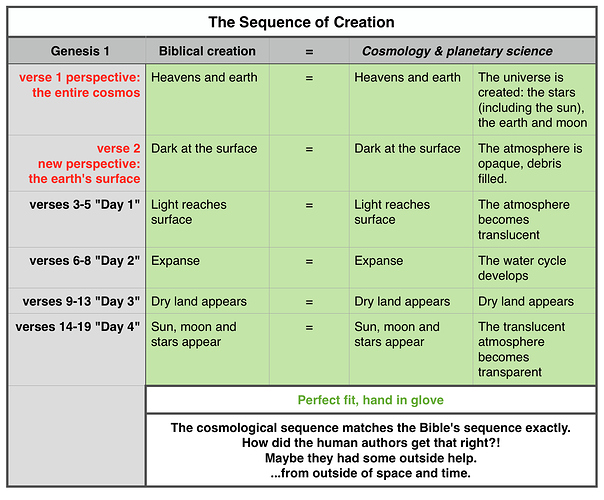Still an irenic gesture @Patrick, and though we don’t have a precise way of referring to it, we don’t know what happens outside our view.
It is true that the first two Greek words of John 1:1 match the Septuagint’s Genesis 1:1 first two words. Nevertheless, many theologians have considered the “scope” of the two beginnings to be quite different. Many consider Genesis 1:1 to refer—at the earliest– to the creation/beginning of the heavens and the earth. In contrast, many Christians believe that John 1:1 refers to the pre-incarnate Son of God having fellowship with God the Father separate from (and therefore “before”, if we stretch temporal language boundaries) the creation of the universe. This fact reinforces what @Swamidas wrote about “other beginnings.”
What you illustrate with a time line? ![]()
As opposed to relativistic time, à la the twin paradox. And I believe that God is atemporal or omni-temporal, and not subject to the constraints of linear time, as we are.
Good question. And that is why in my post of just seconds ago (no doubt after you posted this question) I included the caveat “if we stretch temporal language boundaries.” Yes, we humans are time-bound creatures who lack experience living outside of time. As a result, we are forced to use imprecise and even clumsy language in discussing these kinds of topics.
Tensed language is all we have.
I think you mean spacetime. Wow atemporal or omni-temporal - no time or all time. You might have more success by using imaginary numbers to describe God’s time. ![]()
And with the Hebrew Old Testament, we don’t even get much help from verb tenses—considering how Classical Hebrew doesn’t have the kind of inflected verb tenses we tend to take for granted in modern Indo-European languages. (Indeed, chronology is also a bit of an obsession in our culture but not so much in the Semitic language cultures of the Ancient Near East. Of course, that is something a lot of six-day Young Earth Creationist writers don’t discuss. So they tend to be dismissive toward regarding the six-YOM structure of Genesis 1 as a literary device and genre trait.)
Since we are ‘revelationists’, as I think the term was that Josh used in the video with Ann, we believe that the ultimate author of scripture is God. Since Genesis 1 is such a unique piece of literature, even miraculous, I think there can be two true and nonconflicting narratives in one text, an ANE-literary framework perspective and a day-age one, not unlike the depiction of two women in one drawing:
I don’t personally hold to a day-age view. But I’m certainly fine with a multi-view hermeneutic (including then-and-now dual views, for example.)
It is not unlike that there can be dual fulfillment to some prophecies. One that I think of as a possibility is Daniel 2:43, where it could be talking about the traditionally held Rome, but it could also be the USA.
Regarding the day-age view, I like the Rossian concordance idea that the sequence in Genesis 1 matches the cosmological sequence.
IN THE BEGINNING means the start of what was to follow. so what was to follow needs a origin. A start!
so it then detailed the start. this is gods start and , possibly, humans have trouble understanding it.
case in point understanding gods idea on what light is.
Very different from present light speedsters advocates.
God also said he created a man out of dust and a woman out of him. Not like the animals.
It goes on from there.
The Bible also says that you and I and all animals are made from dust.
‘Luck’ is not in my working vocabulary. ![]()
oh yeah. Yet it still is a first dude.no one before.
I appreciate the replies to my inquiry into “In the beginning.” I should have clarified which beginning I was referring to, and I will try not to make that mistake again. The beginning I was referring is found in Genesis chapter 1, when the writer said “In the beginning God created the heavens and earth.” From my understanding Moses has traditionally been credited in having the book put together. It would seem plausible that Moses had some comprehension what it meant. Since his generation believers, and non- believers of the bible, theologians, linguist, philosophers, and now scientist have been adding to our understanding the possible meaning of the phrase. What are the rules, principles or methodologies used to understand? If more than one method, which has priority?
Why? It seems a forced marriage in which neither party is happy. The greatest absurdity (though it’s hard to choose) is the idea that the creation of the sun, moon, and stars on day 4 is really just a change in the atmosphere, and that somehow this happened after the creation of plants…
So then, you concede that the Bible’s description of people and animals as being formed from dust does not rule out their being produced by natural processes, such as gestation.
The word order in the text in Genesis 1 supports it, if you read carefully, no forcing required.
Genesis 1:14-19. He let there be lights in the heavens – the perspective is from the earth’s surface, per verse 2 (see the chart). “Let” is not the same as “made” or “placed”. Notice that the “and it was so” precedes “God made” and “God set”. Also note that verses 16-18 are not about when they were made, but why. The atmosphere then becomes transparent – the preexisting heavenly bodies can now be seen. And we do not have to invent a source of light for Days 1-3, as do YECs.
Nonsense. “Let” is what happens at the start of each day. “Let there be light. And there was light.” That means God creates light (and other things) just by saying so, just like Captain Picard saying “make it so.” There’s nothing at all in Genesis about the atmosphere. There’s nothing in science about the atmosphere becoming transparent some time after plants evolved either. You’re force-fitting the words and the facts to match each other. (Incidentally, the first plants appear considerably after the first animals; yet another problem for your stories.)

